Data scientists are at the heart of transforming raw data into actionable insights. They play a crucial role in interpreting complex data to help organizations make informed decisions.
Essential skills for a data scientist include proficiency in programming languages like Python or R, understanding of statistical analysis, and expertise in machine learning techniques. Additionally, they must possess strong analytical thinking and communication abilities.
Candidates can write these abilities in their resumes, but you can’t verify them without on-the-job Data Scientist skill tests.
In this post, we will explore 8 essential Data Scientist skills, 10 secondary skills and how to assess them so you can make informed hiring decisions.
Table of contents
8 fundamental Data Scientist skills and traits
The best skills for Data Scientists include Statistical Analysis, Machine Learning, Data Wrangling, Programming Proficiency, Data Visualization, Big Data Technologies, Database Management and Advanced Mathematics.
Let’s dive into the details by examining the 8 essential skills of a Data Scientist.
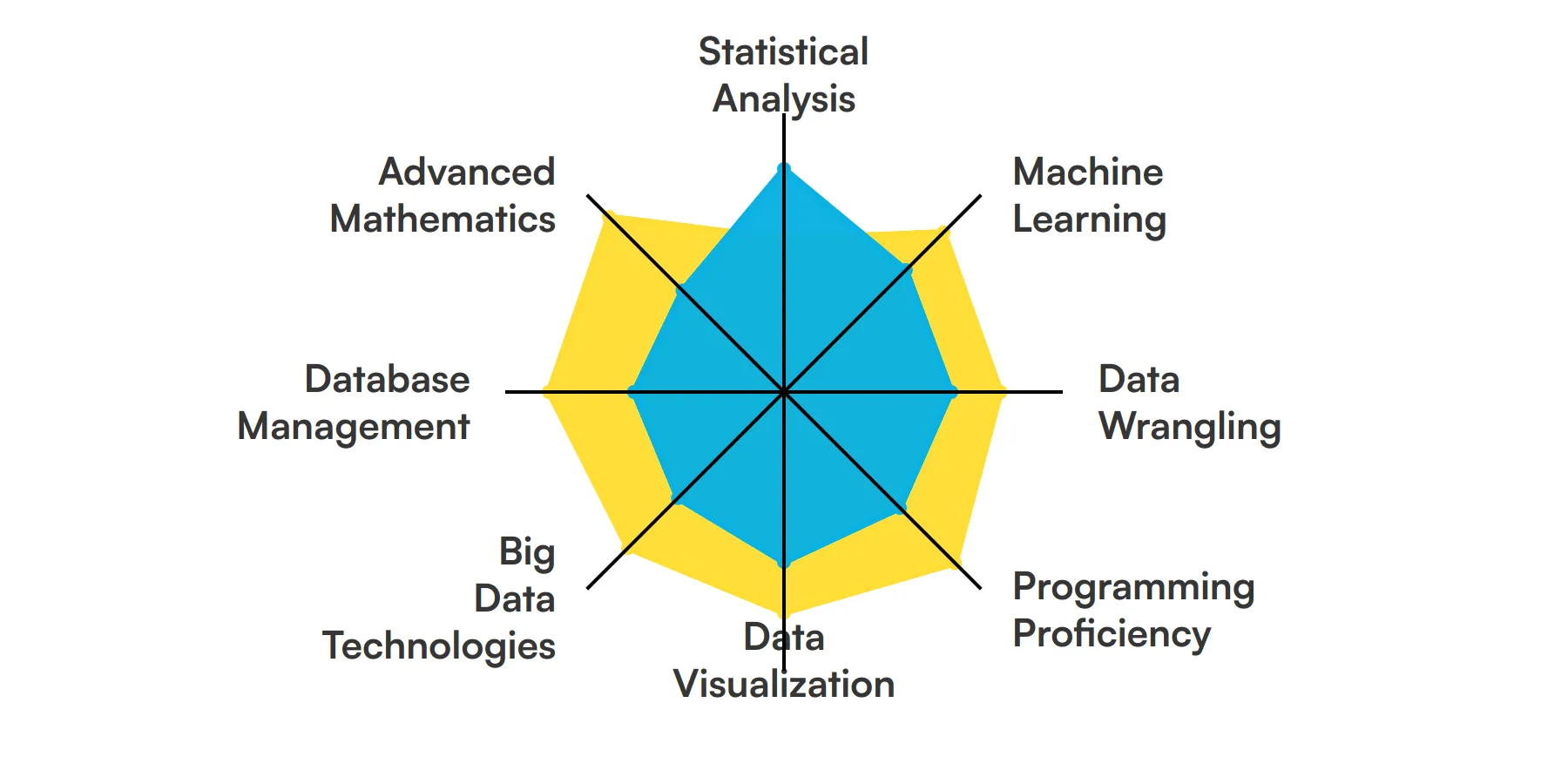
Statistical Analysis
Statistical analysis allows data scientists to understand, interpret, and derive predictions from data. By applying statistical models, a data scientist can identify trends, test hypotheses, and make informed decisions that are crucial for business strategy.
For more insights, check out our guide to writing a Data Scientist Job Description.
Machine Learning
Machine learning is a core skill for data scientists, enabling them to create predictive models from complex data sets. This skill involves training algorithms to make classifications or predictions, uncovering key insights that can lead to innovative solutions and smarter business moves.
Data Wrangling
Data wrangling, or cleaning and structuring data, is essential before any analysis can take place. Data scientists spend a significant amount of time transforming and enriching raw data into a usable format, ensuring the accuracy of their insights and models.
Programming Proficiency
Proficiency in programming languages such as Python or R is fundamental for a data scientist. These tools are necessary for handling data, performing analyses, and building algorithms, serving as the backbone of data manipulation and analysis tasks.
Data Visualization
Data visualization is key for translating complex results into understandable insights. Using graphical representations, data scientists can communicate findings effectively to stakeholders, facilitating data-driven decision-making processes.
Check out our guide for a comprehensive list of interview questions.
Big Data Technologies
Familiarity with big data technologies like Hadoop or Spark is important for handling and processing large datasets efficiently. This skill is particularly relevant in environments where data scientists need to extract insights from vast amounts of data quickly.
Database Management
Understanding database management is crucial for accessing, storing, and retrieving data. Data scientists use SQL and NoSQL databases to manage data, ensuring they can handle and query data efficiently as part of their analysis workflow.
For more insights, check out our guide to writing a Database Administrator (DBA) Job Description.
Advanced Mathematics
A strong grasp of advanced mathematics, including calculus and linear algebra, supports the development of complex models in data science. This knowledge is essential for understanding the theoretical foundations of algorithmic techniques.
10 secondary Data Scientist skills and traits
The best skills for Data Scientists include Business Acumen, Communication Skills, Data Ethics, Cloud Computing, Deep Learning, Project Management, Collaborative Skills, Continuous Learning, Experimental Design and Optimization Techniques.
Let’s dive into the details by examining the 10 secondary skills of a Data Scientist.
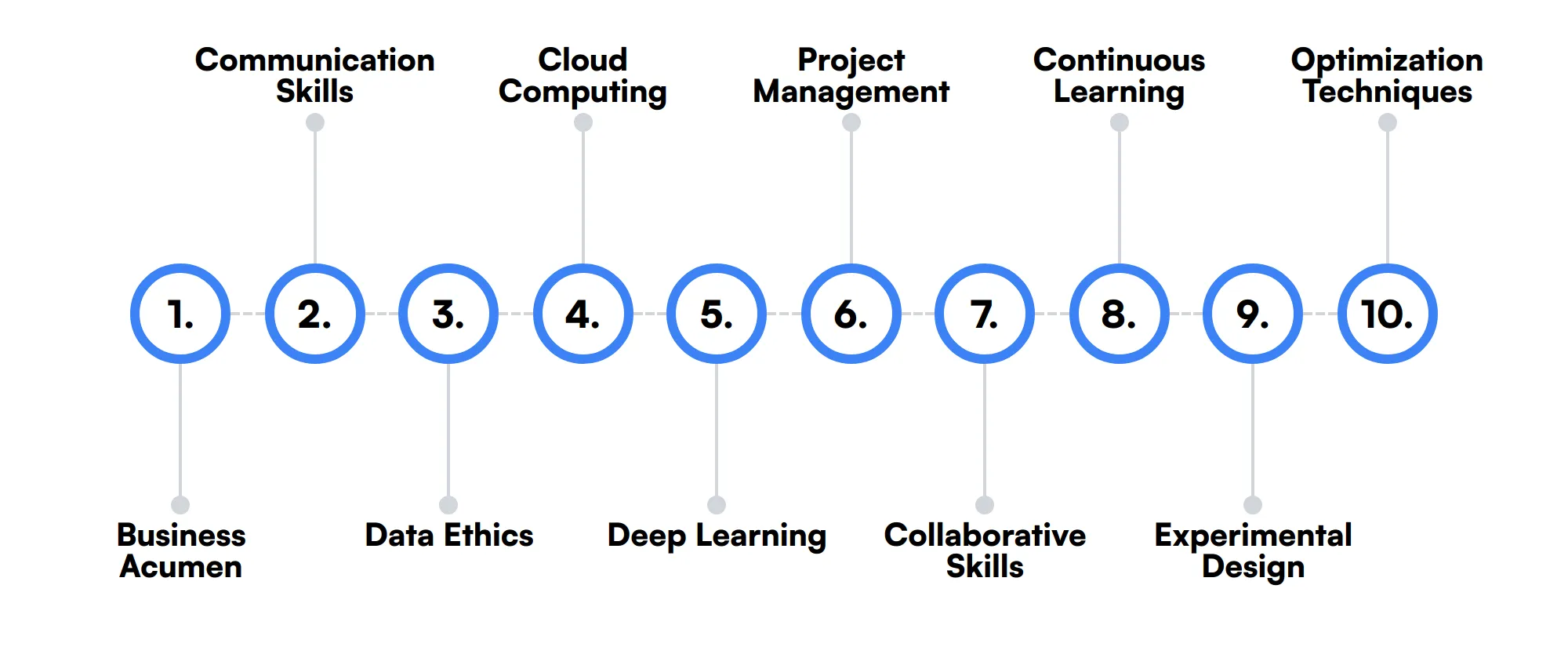
Business Acumen
Understanding industry-specific knowledge helps data scientists apply their technical skills in a context that maximizes business value.
Communication Skills
Effective communication is necessary for presenting data insights in a clear and persuasive manner to non-technical stakeholders.
Data Ethics
Knowledge of data privacy, security, and ethical use ensures that data scientists manage and analyze data responsibly.
Cloud Computing
Skills in cloud platforms like AWS, Azure, or Google Cloud enable data scientists to deploy scalable models and handle data across distributed systems.
Deep Learning
Understanding deep learning techniques is beneficial for projects involving complex image, text, or audio data.
Project Management
Ability to manage projects ensures that data science initiatives are completed within scope and on time.
Collaborative Skills
Working effectively in team settings is important as data science projects often require cross-functional collaboration.
Continuous Learning
The field of data science is ever-evolving, and staying updated with the latest technologies and methodologies is crucial.
Experimental Design
Skills in designing experiments can help in testing hypotheses and making causal inferences from data.
Optimization Techniques
Knowledge of optimization techniques is useful for improving the performance of models and algorithms.
How to assess Data Scientist skills and traits
Assessing the skills and traits of a Data Scientist can be a challenging task, given the diverse range of expertise required in this field. From statistical analysis and machine learning to data wrangling and programming proficiency, a Data Scientist must be adept in multiple areas to effectively analyze and interpret complex data sets.
Traditional resumes and certifications may not provide a complete picture of a candidate's abilities. To truly understand a Data Scientist's competencies, skills-based hiring practices, such as talent assessments, are essential. These assessments can help you evaluate a candidate's proficiency in key areas like data visualization, big data technologies, database management, and advanced mathematics.
For a more streamlined and accurate evaluation process, consider using Adaface on-the-job skill tests. These assessments can help you achieve a 2x improved quality of hires and an 85% reduction in screening time, ensuring you find the right fit for your team.
Let’s look at how to assess Data Scientist skills with these 6 talent assessments.
Statistics Test
Our Statistics Test evaluates a candidate's understanding and proficiency in statistical concepts and analysis.
The test covers statistical methods, data analysis, numerical reasoning, and quantitative aptitude. It includes questions on statistics fundamentals, inference, data sampling, regression, and probability.
Successful candidates demonstrate a strong grasp of exploratory data analysis, non-parametric statistics, and sampling distributions.
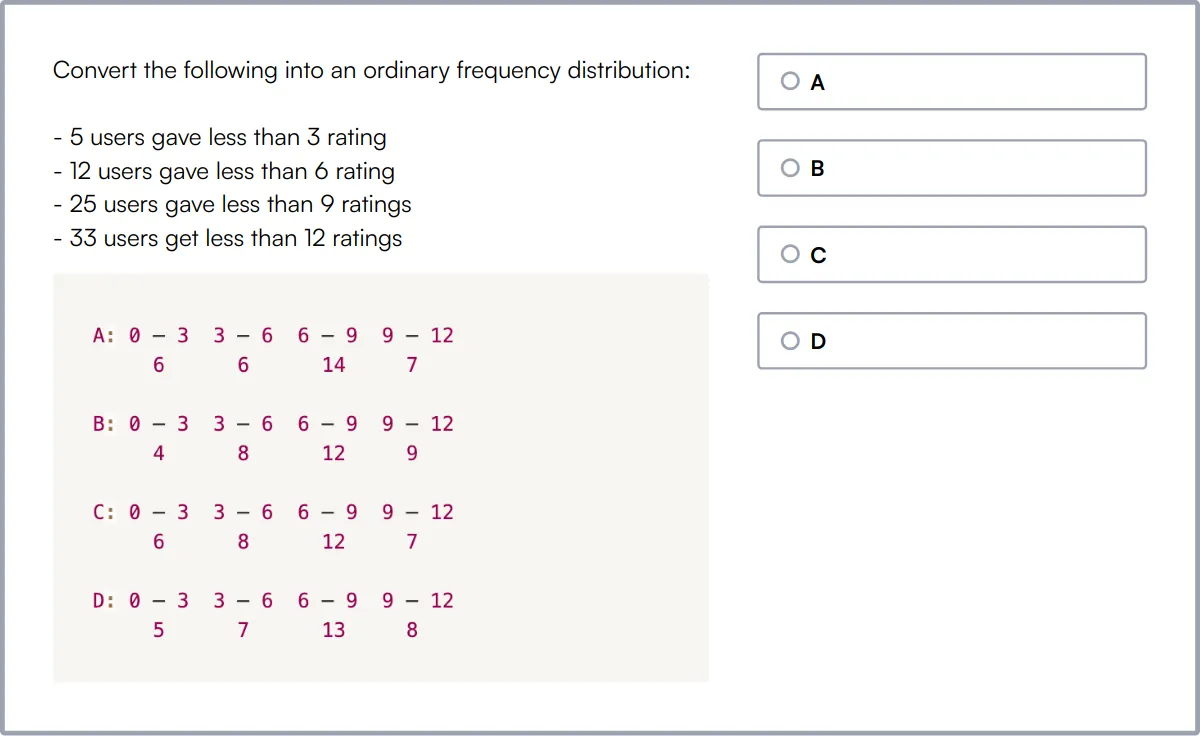
Machine Learning in AWS Online Test
The Machine Learning in AWS Online Test evaluates a candidate's knowledge and understanding of machine learning concepts and their application in the AWS environment.
The test focuses on data science, data analysis, and programming languages like Python. It assesses the candidate's ability to leverage AWS services for implementing machine learning solutions.
Candidates are tested on their proficiency in Kubernetes, AWS DevOps, and their ability to integrate machine learning techniques within the AWS ecosystem.
Data Wrangling Test
The Data Wrangling Test evaluates a candidate's skills in cleaning, transforming, and organizing raw data into a structured format suitable for analysis.
The test covers data extraction, data parsing, data integration, and quality assessment. It also assesses data validation, data modeling, and data interpretation.
Candidates who excel in this test demonstrate strong abilities in data analysis and data entry processes.
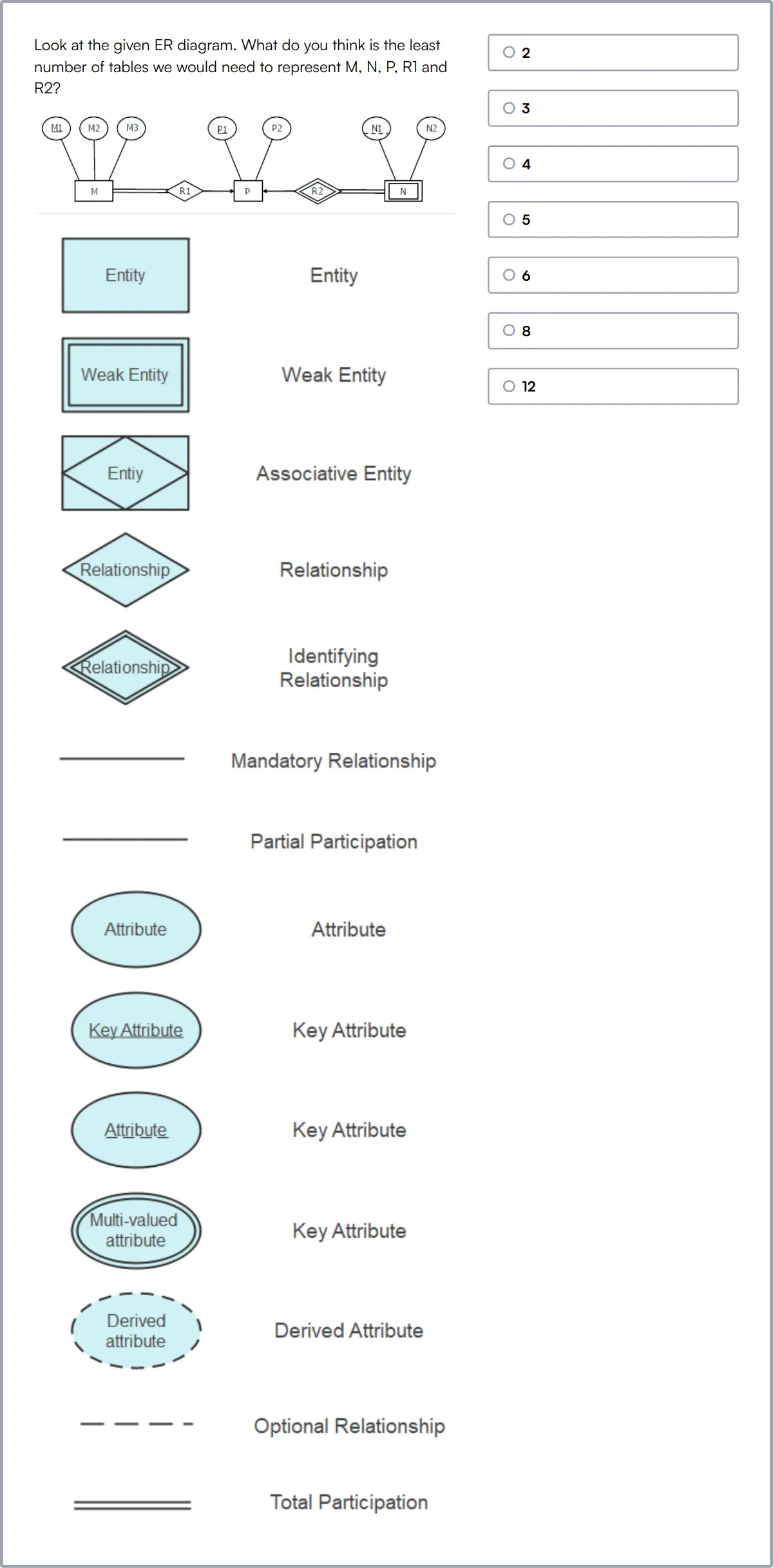
Python Online Test
The Python Online Test evaluates a candidate's ability to use Python data structures, manage files, handle exceptions, and structure code using Object-Oriented Programming principles.
The test includes questions on Python fundamentals, data structures, errors and exceptions handling, and scripting and web scraping. It also covers in-built functions and modules, functional programming, and debugging tools.
High-scoring candidates show proficiency in accessing and manipulating databases and demonstrate strong debugging skills.
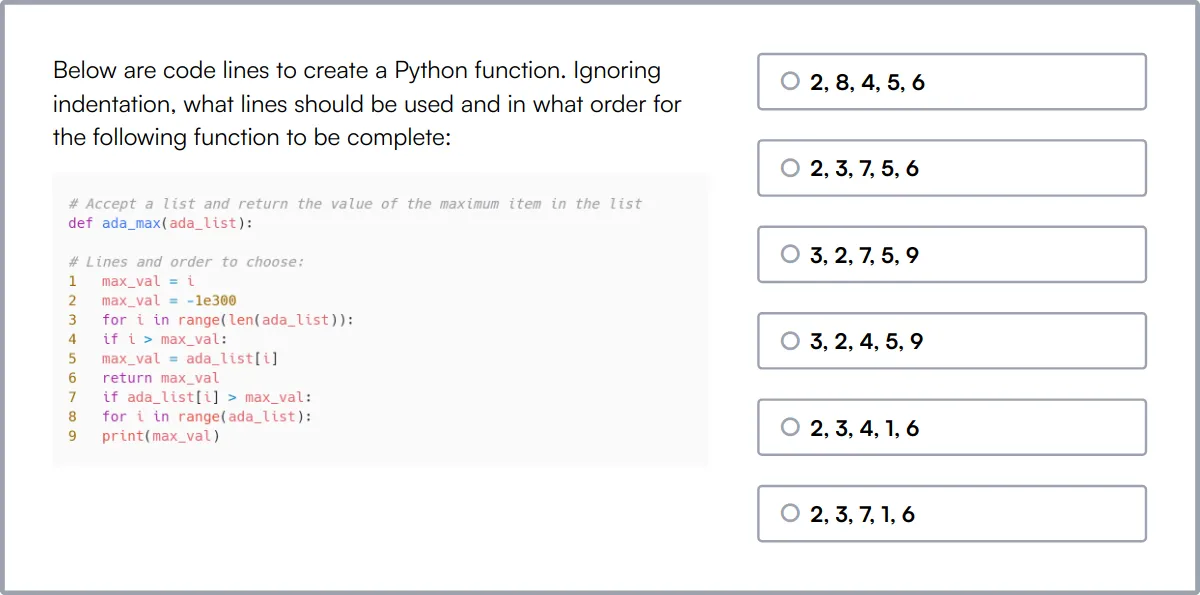
Tableau Online Test
The Tableau Online Test evaluates the candidate's ability to connect data from multiple sources into Tableau, analyze the cleaned data, and create and format data dashboards.
The test covers connecting with data, cleaning data, managing Tableau worksheets and workbooks, and creating dashboards and actions. It also includes Tableau calculations, dimensions and measures, and visualizations.
Candidates who perform well demonstrate skills in publishing and sharing visualizations and using aggregations and LOD.
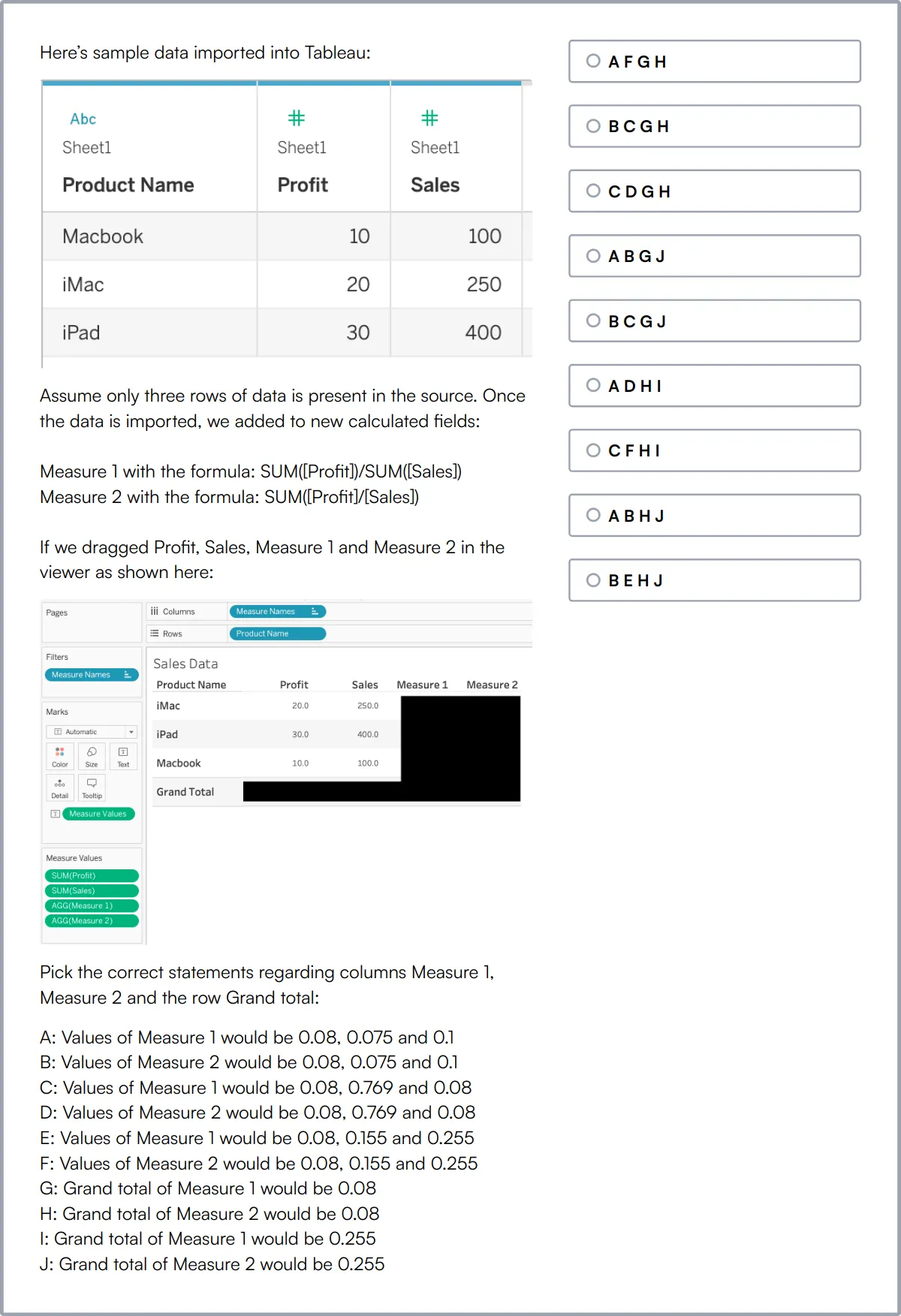
Hadoop Online Test
The Hadoop Online Test uses scenario-based MCQ questions to evaluate candidates' ability to install Hadoop clusters, run optimized MapReduce jobs, and write efficient Pig instructions and Hive queries.
The test covers core Hadoop architecture, writing Hive and Pig queries, handling streaming data, and working with different file formats. It also assesses troubleshooting and monitoring skills.
Successful candidates demonstrate a strong understanding of HDFS, YARN, and publishing data to clusters.
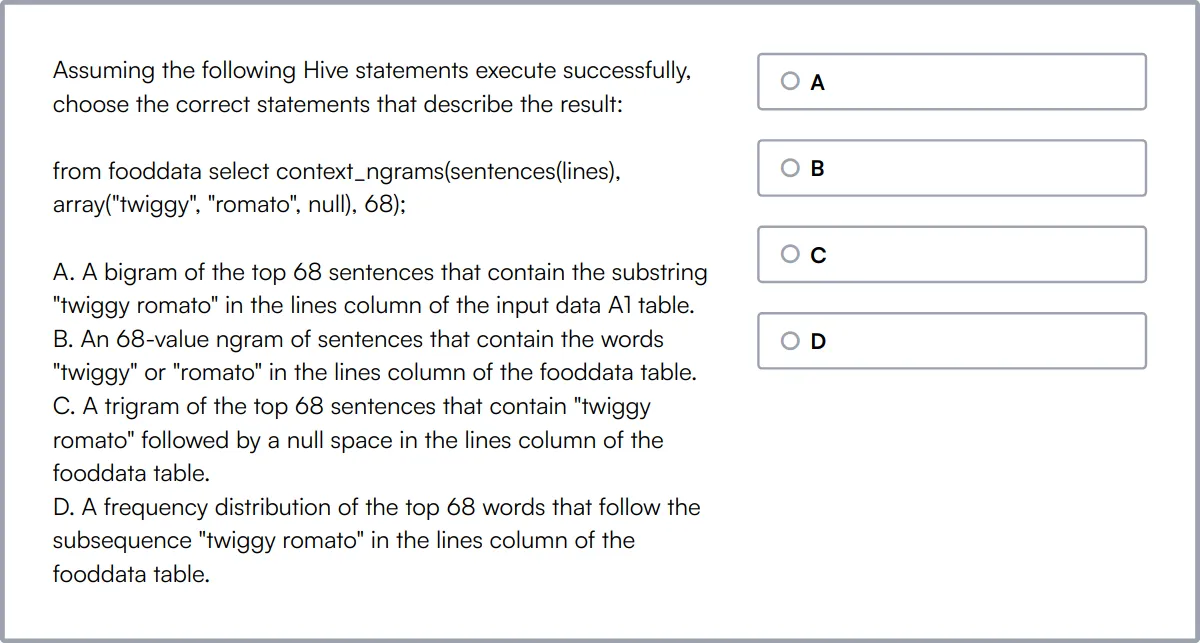
Summary: The 8 key Data Scientist skills and how to test for them
| Data Scientist skill | How to assess them |
|---|---|
| 1. Statistical Analysis | Evaluate ability to interpret and analyze data trends and patterns. |
| 2. Machine Learning | Assess proficiency in building and deploying predictive models. |
| 3. Data Wrangling | Check skills in cleaning and transforming raw data. |
| 4. Programming Proficiency | Gauge coding skills in languages like Python or R. |
| 5. Data Visualization | Determine ability to create clear and insightful visual data representations. |
| 6. Big Data Technologies | Evaluate experience with tools like Hadoop and Spark. |
| 7. Database Management | Assess skills in designing and managing relational and non-relational databases. |
| 8. Advanced Mathematics | Check understanding of complex mathematical concepts and algorithms. |
Data Analytics in Azure Online Test
Data Scientist skills FAQs
What are the key skills required for a Data Scientist role?
Key skills include Statistical Analysis, Machine Learning, Data Wrangling, Programming Proficiency, Data Visualization, Big Data Technologies, and Database Management.
How can recruiters assess a candidate's proficiency in Machine Learning?
Recruiters can assess Machine Learning proficiency through technical interviews, coding challenges, and reviewing past projects or publications related to Machine Learning.
Why is Business Acumen important for Data Scientists?
Business Acumen helps Data Scientists understand the business context, enabling them to provide actionable insights and align their work with organizational goals.
What methods can be used to evaluate a candidate's Data Wrangling skills?
Data Wrangling skills can be evaluated through practical tests, case studies, and reviewing the candidate's experience with data cleaning and transformation tools.
How important are Communication Skills for a Data Scientist?
Communication Skills are important for explaining complex data insights to non-technical stakeholders and collaborating effectively with team members.
What role does Cloud Computing play in Data Science?
Cloud Computing provides scalable resources for data storage, processing, and analysis, enabling Data Scientists to handle large datasets and complex computations.
How can recruiters assess a candidate's ability in Data Visualization?
Assess Data Visualization skills by reviewing portfolios, conducting practical tests, and asking candidates to explain their visualization choices in past projects.
What is the significance of Continuous Learning for Data Scientists?
Continuous Learning is important for staying updated with the latest tools, techniques, and trends in the rapidly evolving field of Data Science.
Assess and hire the best Data Scientists with Adaface
Assessing and finding the best Data Scientist is quick and easy when you use talent assessments. You can check out our product tour, sign up for our free plan to see talent assessments in action or view the demo here:

40 min skill tests.
No trick questions.
Accurate shortlisting.
We make it easy for you to find the best candidates in your pipeline with a 40 min skills test.
Try for freeRelated posts
Free resources



